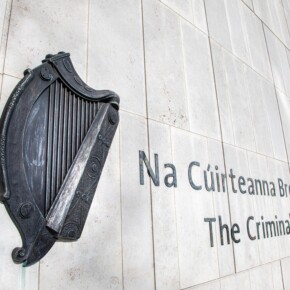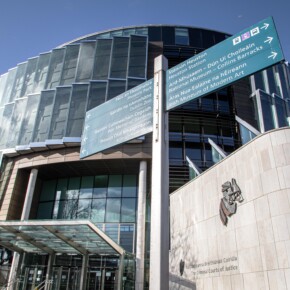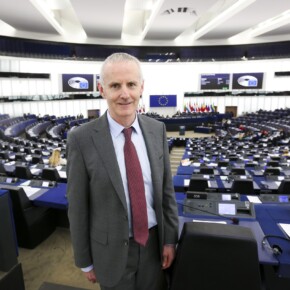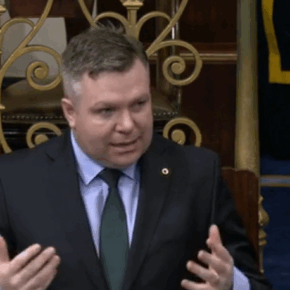Community Law & Mediation calls upon Irish government to include recommendations in 2023 Climate Action Plan
Padraig Conlon 07 Nov 2022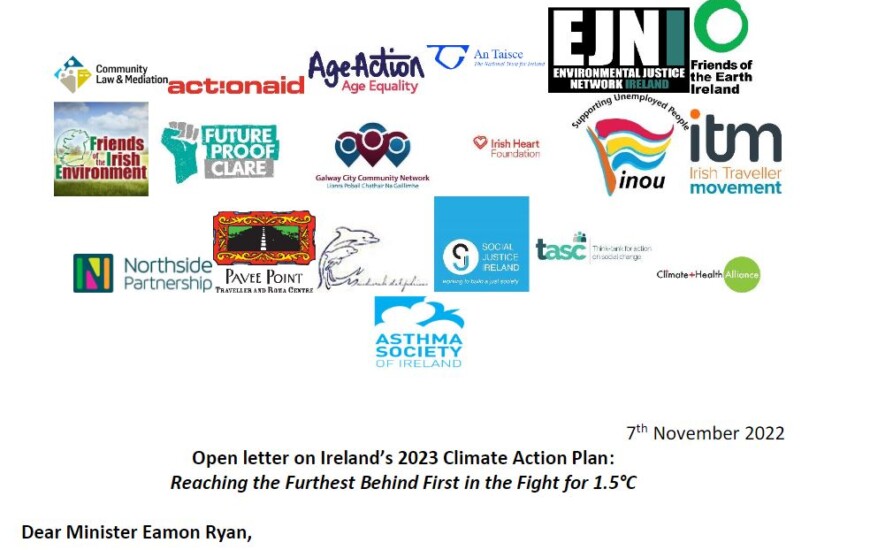
Today, Community Law & Mediation sent an open letter to the Minister for Climate, Environment and Communications, Eamon Ryan.
The letter calls upon the Government to align the forthcoming Climate Action Plan 2023 with Ireland’s legal obligations on climate change, while addressing the energy crisis and safeguarding marginalised communities.
The recommendations are supported by 19 partner organisations working in the area of environmental and social justice.
The six-page letter sets out science-based recommendations which the Irish government should include in the 2023 Climate Action Plan.
A summary of these recommendations is:
- Holding all sectors accountable in meeting Ireland’s legally-binding 2021-2025 carbon budget:
The organisations are calling for the government to ensure the immediate implementation of Ireland’s 2021-2025 carbon budget, the inclusion of all sectors in the Sectoral Emissions Ceilings, and the publication of the Long-Term Climate Action Strategy in accordance with EU and national law.
- One-third of Ireland’s legally-binding five-year carbon budget period (2021-2025) has already passed, yet Ireland’s emissions rose by 5% last year and may increase in 2022.
- Not all sectors are included within the carbon budget framework – most notably, “Land Use, Land Use Change and Forestry,” and Aviation and Shipping. The total amount of greenhouse gases across all sectors therefore cannot be assessed, and there is no certainty that Ireland will meet its first legally binding carbon budget.
- Ireland is one of only four countries that has failed to produce a Long-Term Climate Action Strategy and the European Commission recently issued a formal notice to Ireland as the Strategy is now more than two and a half years overdue.
- Addressing the energy crisis:
Energy poverty is at its highest recorded rate in Ireland. The organisations are calling upon the Irish government to implement measures in the Climate Action Plan 2023 to eradicate both energy poverty and energy pollution, such as, doubling the Fuel Allowance Scheme and broadening its eligibility criteria, retrofitting Ireland’s entire social housing stock this decade, introducing a new caravan rental scheme which incorporates BER equivalent efficiency standards and providing free and reliable public transport across Ireland.
In addition, the organisations are calling for the current moratorium on Liquefied Natural Gas and fracked gas imports, to be made permanent through legislation, alongside an immediate moratorium on the development of data centres until an assessment of what is needed to meet the carbon budget from 2021-2025 is carried out.
- Safeguarding vulnerable communities in the transition to a completely decarbonised society:
In Ireland, the top 10% of the population contributed about one third of the cumulative carbon emissions between 1990 and 2015. Low-income households and marginalised groups who are least responsible for the climate crisis are at risk of being most impacted by both climate change and climate action. The organisations are therefore calling for the Climate Action Plan 2023 to address inequality and ensure that the cost of climate mitigation and adaptation measures do not fall on marginalised and vulnerable groups.
In addition, the Irish government must immediately establish a National Just Transition Commission, in advance of formal legislation, based on social dialogue and comprised of representatives of government, trade unions, employers, affected communities and civil society. The aim of this is to ensure that affected workers and communities are not left behind in the transition to a completely decarbonised economy and society.
Clodagh Daly, Community Law & Mediation’s Centre for Environmental Justice Manager, said: “It is imperative that the Irish government commits to deep and sustained reductions in emissions in the Climate Action Plan 2023. Action must be consistent with our legally-binding 2021-2025 carbon budget and must aim to actively address inequality and energy poverty, such as retrofitting our entire social housing stock this decade and providing free and reliable public transport across Ireland.
“As part of this, the establishment of the Just Transition Commission must be accelerated. We must ensure that everyone in Ireland – and worldwide – can live a decent life within a fully decarbonised society.”
Martin Collins, Co-Director of Pavee Point Traveller & Roma Centre, said: “Pavee Point Traveller & Roma Centre endorses this call on the Government to strengthen the Climate Action Plan 2023. It is well documented that the effects of the climate crisis are inextricably linked with existing social and economic inequalities.
“For example, a 2019 report from Traveller MABS on energy poverty found that Travellers are 9 times more likely to go without heat than members of the general population. We urge the Government to include and consider the voices of ethnic minority groups – including Travellers and Roma – in any policy relating to climate action and a just transition.”
Michelle Murphy, Research and Policy Analyst with Social Justice Ireland, stated: “One of the fundamental principles of a Just Transition is to leave no people, communities, economic sectors or regions behind as we transition to a low carbon future. There is enough money in the economy to begin to implement the Climate Action Plan, secure our energy infrastructure, and ensure a just transition to a green economy. This would also mean, emission reductions, and the creation of a vibrant society and economy.”
Ciara Brennan, Director of Environmental Justice Network Ireland, said: “Ireland must stop planning to fail when it comes to climate action. An ambitious Climate Action Plan for 2023 must be linked to a robust and credible national long-term strategy, which is required to meet domestic and EU obligations, and which will give direction to all domestic level climate plans and policies. A clear plan for how to get to our end destination is crucial in order to protect Ireland from economic shocks amidst the energy and cost of living crises and will allow the true cost of decisions being made now around climate action to be seen within the long-term context.”
The 2023 Climate Action Plan is due to be published by the Irish government before January 2023. CAP23 will outline the detailed plan in the year ahead to reduce greenhouse gas emissions between now and 2024.


